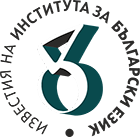Author: Maria Todorova
Inscriptions on bells from the churches in the Smolyan district – epigraphic monuments from the end of the 19th and the first half of the 20th century
Georgi Mitrinov Institute for Bulgarian Language, Bulgarian Academy of Sciences Abstract The study is dedicated to the inscriptions on bells from the churches in the Smolyan parish of the Plovdiv diocese. The inscriptions on over 50 church bells have been studied. A thematic classification was made for them, as well as a diachronic classification. Their […]
Read More → Inscriptions on bells from the churches in the Smolyan district – epigraphic monuments from the end of the 19th and the first half of the 20th centuryDirections of migration from the earliest times to the present time; today‘s Bulgarian emigrants in the most distant place from us
Katya Issa University of Architecture, Civil Engineering and Geodesy Abstract The directions and problems of migration from and to Bulgaria during different historical periods are analyzed in this text. Emphasis is placed on the interpenetration of different languages. The processes of adaptation on the part of the Bulgarian emigrants around the world to the new […]
Read More → Directions of migration from the earliest times to the present time; today‘s Bulgarian emigrants in the most distant place from usTruth until proven otherwise: the renarrative and its possible (in)uses in journalistic headlines today
Ruslana Margova GATE Institute, Sofia University St. Kliment Ohridski Abstract The research starts from the hypothesis that renarrative in Bulgarian can be used in journalistic texts to report something that is not necessarily verified and reliable, according to the requirements of the journalistic profession. News headlines analyzed through the prism of the use of renarrative […]
Read More → Truth until proven otherwise: the renarrative and its possible (in)uses in journalistic headlines todayEtymology and semantic typology. Regularity of semantic development in Bulgarian verb vocabulary
Krasimira Fuchedzhieva Institute for Bulgarian Language, Bulgarian Academy of Sciences Abstract The study is focused on the semantic aspect of etymological analysis. It is mainly oriented towards the etymological lexicographic practice in the “Bulgarian Etymological Dictionary” (BER) and focuses on revealing the typology of semantic changes within an etymological nest. A systematic approach is applied […]
Read More → Etymology and semantic typology. Regularity of semantic development in Bulgarian verb vocabularyThe relationship of equivalence between selected Polish and Bulgarian legal terms in court acts (criminal cases)
Natalia Długosz Institute of Slavic Philology, Adam Mickiewicz University in Poznań Abstract: The article juxtaposes Polish and Bulgarian terms in terms of the names of courts, the names of court authorities, assistants, parties and other persons involved in the case in Polish and Bulgarian. The compilation of the juxtaposition made it possible to resolve what […]
Read More → The relationship of equivalence between selected Polish and Bulgarian legal terms in court acts (criminal cases)About some basic lexicographic terms
Tsvetelina Georgieva Institute for Bulgarian Language, Bulgarian Academy of Sciences Abstract: The study is the first attempt in Bulgarian linguistics to purposefully present and define basic lexicographic terms such as dictionary entry, headword, etc. with a view to an explanatory dictionary. It answers the question of how many headwords there are in the headwords area […]
Read More → About some basic lexicographic termsThe nouns, formed by the suffix -ик, in the derivational category Agent from the view of the Theory of predicate-argument structure
Lora Zheleva Institute for Bulgarian Language, Bulgarian Academy of Sciences Abstract The paper presents an analysis of the derived nouns, formed by the suffix -ик, which are in the derivational category Agent. The theory of the predicate-argument structure is applied. It is assumed that the suffix -ик in these nouns expresses the argument Agent and […]
Read More → The nouns, formed by the suffix -ик, in the derivational category Agent from the view of the Theory of predicate-argument structureUses of sam, bada, bivam and bidoh in the Modern Bulgarian language
Krasimira Aleksova Sofia University St. Kliment Ohridski Abstract: In the present study, the uses of sam, bada, bivam and bidoh as copulas or as auxiliary verbs in various evidentials and voices in the modern Bulgarian language are investigated. The competition between both sam and bada and between sam and bivam, byah and bidoh is […]
Read More → Uses of sam, bada, bivam and bidoh in the Modern Bulgarian languageThe class Verbs in Normative grammar (general characteristics with a description of categories conjugation, person, number, tense and identification of verb inflectional types)
Ruska Stancheva Institute of Bulgarian Language “Prof. Lubomir Andreychin”, Bulgarian Academy of Sciences Abstract: Based on the formal approach, the study characterizes the class of verbs in normative grammar. The categories of conjugation, person, number, tense are described and a number of new observations are made about their functioning in view of the current literary […]
Read More → The class Verbs in Normative grammar (general characteristics with a description of categories conjugation, person, number, tense and identification of verb inflectional types)The allegorical exegesis (the theology of parables) in the Slavonic translation of the letter to Marcellinus on the interpretation of the psalms
Pirinka Penkova Prof. PhD, Independent researcher, Kalundborg (Denmark) Abstract The Church Slavonic translation of The Letter to Marcellinus on the Interpretation of the Psalms (Еἰς τὴν ἑρμενείαν τῶν ѱαλμῶν) is published in the Russian Bible of 1663, placed before the Psalter just as in the famous 5th centuries Greek Codex Alexandrinos. Athanasius of Alexandria’s allegorical […]
Read More → The allegorical exegesis (the theology of parables) in the Slavonic translation of the letter to Marcellinus on the interpretation of the psalms
